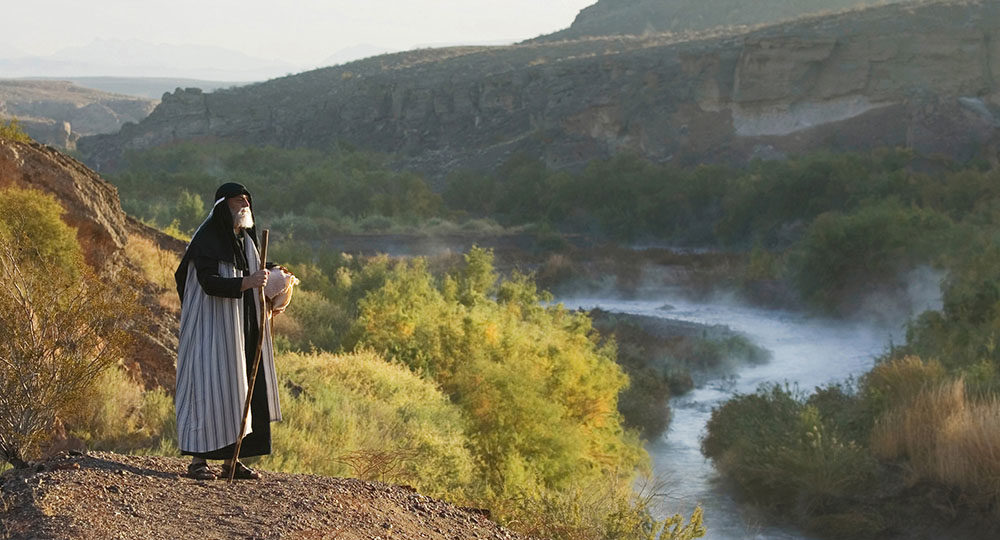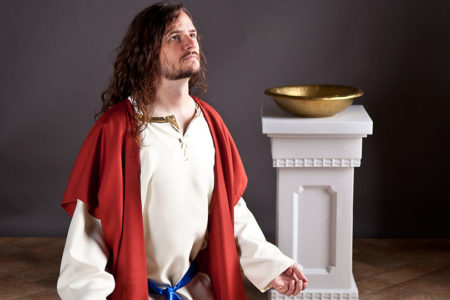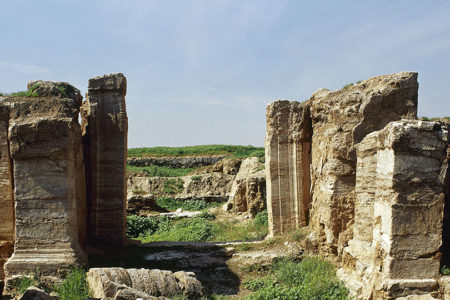The Seven Keys to History Part Four
The Chosen People and Call of Israel
The first three keys to history are found in the first 2,000 years of the world, from Genesis 1 through 11: creation, corruption, and catastrophe. Genesis 12 holds the fourth key: the Chosen People and call of Israel.
Redemption
God has chosen to redeem the world through Israel: “In you all the families of the earth shall be blessed” (Gen. 12:3). He gave that promise to Abraham, then to Isaac, Jacob, and the entire Jewish nation. Today Abraham stands at the head of the Jewish nation. The New Testament says all who come to faith in Jesus are sons of Abraham. So he is both the father of Israel and of all true Christians.
Furthermore, with Abraham came a change in humankind’s responsibility: Beginning with Genesis 12, people were to glorify God through living by faith in His promises.
God called Abraham out of Babylonian territory (Ur of the Chaldeans) and idolatry (Josh. 24:2), promising him,
I will make you a great nation; I will bless you and make your name great; and you shall be a blessing. I will bless those who bless you; and I will curse him who curses you, and in you all the families of the earth shall be blessed….To your descendants I will give this land [Canaan] (Gen. 12:2–3, 7).
Nevertheless, Abraham struggled to live by faith, just as you and I do. When a famine hit Canaan, Abraham went to Egypt, rather than trusting God to provide for him (v. 10). He abandoned the land God promised him and moved from the place of blessing. He even told his wife, Sarah, to say she was his sister; and she was taken into Pharaoh’s harem. But God stepped in to deliver them and send them back to the land, where they started over.
Abraham had no Bible. God’s Word had not been written yet. So his responsibility was to appropriate God’s promise and to live by it.
His near-sacrifice of his son Isaac reveals Abraham’s tremendous faith, which developed over the years. The Bible says he so deeply believed God’s promise to multiply his descendants through Isaac that he thought God would raise Isaac from the dead (Heb. 11:19). God, of course, prevented the sacrifice. But Abraham glorified God by living by faith in His promises, which is exactly what God wants us to do today.
Genesis 15 is a turning point. According to Romans 4 and James 2, that is when Abraham was born again, to use New Testament terminology. God told Abraham to look at the stars, and He promised to make Abraham’s descendants equally as numerous. “And he [Abraham] believed in the Lᴏʀᴅ, and He accounted it to him for righteousness” (Gen. 15:6; cf. Rom. 4:3; Jas. 2:23). God made Abraham righteous based on faith alone.
So Abraham became a believer in God and stands at the head of those who come by faith to the redemption experience. Abraham, his son Isaac, and Isaac’s son Jacob (whom God renamed Israel) became the patriarchs of the Israelites. Through Israel, God communicated both His design to redeem humanity and the fact that redemption comes through the Jewish people.
Under Moses, a change took place. Moses built the Tabernacle and ordained Aaron and the Levitical priesthood. Now, instead of only trusting God’s promises, Israel had to follow the specific requirements of the Law. This new stewardship changed how the Israelites were sanctified and how they glorified God. However, it did not change how they were regenerated (born again, given spiritual life).
Like Abraham, they still were born again by God’s grace through faith. Now, however, when believing Israelites sinned, they confessed their sin, offered the appropriate sacrifice, and were forgiven. Their sins were covered, and they were restored.
The Levitical system was designed to point people to the need for something greater. Ultimately, of course, God’s plan was to send Jesus—the perfect, final sacrifice that would remove sin entirely, not merely cover it.
Revelation
God’s plan to reveal Himself to humanity also comes through Israel. With Abraham began a process that led to the production of the Word of God. God appeared to Abraham in Mesopotamia, commanding him, “Get out of your country, from your family and from your father’s house, to a land that I will show you” (Gen. 12:1). Four times God appeared to him in Canaan. He also appeared twice to Isaac; twice to Jacob; and, of course, He appeared to Moses.
While in the desert tending his father-in-law’s sheep, Moses saw a bush that was burning but not being consumed. As he turned to investigate, God spoke:
“Do not draw near this place. Take your sandals off your feet, for the place where you stand is holy ground….I am the God of your father—the God of Abraham, the God of Isaac, and the God of Jacob.” And Moses hid his face, for he was afraid to look upon God (Ex. 3:5–6).
God manifested Himself because, as with Abraham, He called Moses to a specific task. Not only was Moses to lead God’s people out of slavery in Egypt, but he also was to write the first five books of God’s Holy Word: the Torah. These books form the backbone of Judaism. They are Israel’s most sacred writings and are designed to present God.
When you read seemingly tedious passages in Leviticus and Numbers about leprosy and so forth, bear in mind that the point is to reveal God’s holiness and our sinfulness and need for redemption.
The entire Bible, in fact, is a Jewish book. Luke is the only probable Gentile who wrote anything. It is through the nation of Israel that God revealed Himself.
The Torah is followed by the Prophets. The wisdom literature is Psalms, Job, and Proverbs. In the Prophets, God essentially says, “You people of Israel have rejected your God and His revelation, so you’re coming under judgment. If you repent, I’ll bring you back into full-fledged relationship with Me.” That’s the Prophets in a nutshell. In them, God demonstrates over and over again His nature and person, grace and holiness.
In the opening pages of the New Testament, we find that Jesus fulfills the revelation of the Father. What began with Abraham and developed over 2,000 years concludes with the appearance of Jesus, who “fleshes out” God (Heb. 1:1–3).
Jesus is the perfect balance of grace and truth, manifesting God’s nature and character. He Himself said, “He who has seen Me has seen the Father” (Jn. 14:9). God’s plan to reveal Himself comes almost exclusively through the Jewish people via the prophets and writers of Scripture. And if you read Scripture with an open heart, God will manifest Himself to you.
Reclamation
God’s plan is also to reclaim His creation through Israel: “On the same day the LORD made a covenant with Abram [Abraham] saying: ‘To your descendants I have given this land, from the river of Egypt to the great river, the River Euphrates—the Kenites, the Kenezzites, the Kadmonites, the Hittites’” and all the rest (Gen. 15:18–20). Today we think of Israel as a little sliver of territory. But the area God gave the Jewish people runs from the river of Egypt (the Nile) all the way to the Euphrates.
The actual conquest came under Joshua, as God fought for the Israelites. In God’s purpose to reclaim the entire earth, He gave Israel a specific portion. In the person of Jesus, the Jewish Messiah, God ultimately will rule, not only over the land of Israel, but over the whole world.
Daniel 2 teaches that a stone cut without hands will smash all Gentile powers and grow into an everlasting Kingdom that will cover the earth. “One like the Son of Man” will approach the throne of glory and receive the Kingdom, comprised of all nations, tribes, and languages; and He will reign forever (7:13–14). This is the Millennial Kingdom. It will last for 1,000 years on this renewed earth and then continue for eternity.
In the seventh key to history, we’ll see how God will change the earth under the reign of King Jesus, who will be the King of kings and Lord of lords; and nobody will dispute that fact in those days.
Jesus fulfills the roles of all of Israel’s famous leaders:
- He is greater than Abraham. He said, “Your father Abraham rejoiced to see My day, and he saw it and was glad. I say to you, before Abraham was, I AM” (Jn. 8:56, 58). Abraham is the father of all believers; Jesus is the Redeemer of them all.
- He is greater than Moses. God said He would raise up a Prophet like Moses and “put My words in His mouth” (Dt. 18:18). A prophet’s role is to reveal. Jesus revealed God.
- He is greater than Aaron. Aaron headed the Levitical priesthood, which required a succession of high priests because each would die. The book of Hebrews stresses the superiority of Jesus’ priesthood because He lives forever.
- He is greater than Joshua. Whereas Joshua gave the Jewish people the land, Jesus will give them the entire earth.
- He is greater than King David. David said he will bow and worship his own Son (Ps. 110). Jesus, a direct heir of David, will be the Son of David who will rule the earth.
- He is greater than King Solomon, the wisest man who ever lived. Jesus said, “A greater than Solomon is here” (Mt. 12:42; Lk. 11:31).
Israel is central to God’s plan. The Messiah is Jewish. The Kingdom is Jewish. Starting with Abraham’s call, God’s plan—through which He will provide redemption for all the earth and revelation of Himself—is Jewish.
Israel has fallen under judgment for rebellion and been set aside temporarily. But the Abrahamic Covenant has never been rescinded or broken. So God still says that whoever blesses Israel, He will bless, and whoever curses Israel, He will curse.
As a parent, you don’t stop loving or praying for a wayward child. Such is God’s relationship with His child Israel.
Anti-Semitism is on the rise, and we need to be the type of Christians who recognize the Jewish people as God’s Chosen. We need to embrace them and share with them that we love and appreciate both them and the Scriptures that have come down to us through them. Then let God do His work in their lives.







